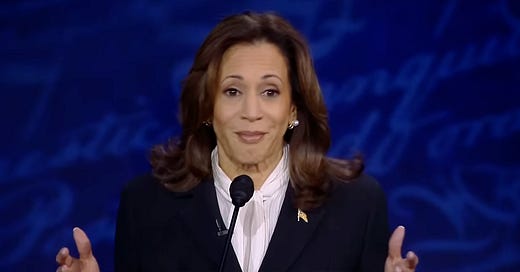Will Kamala's Promise Of $50K For Small Biz Startups Have Union Strings Attached?
[There's been no response from the Harris campaign as yet.]
By Peter List, Editor | September 12, 2024
Update: This article has been changed from its original version. The original version of this article stated that Candidate Harris’ plan was a tax credit when, in fact, her plan is a tax deduction, which is different.
During Tuesday night’s debate between Kamala Harris and Donald Trump, one of the first questions asked to Vice President Harris was whether Americans are better off economically than they were four years ago.
Although she never directly answered the question, one of the statements made during her lengthy answer (watch in full below) was the announcement of a $50,000 tax deduction for small business startups.
WATCH:
While the debate stage may not be the place to go into policy specifics, the promise of $50,000 tax deduction for small business startups has been largely reported by the press, without more specific questions being asked.
Looking for Specifics: According to Harris’ campaign website, “…she will expand the startup expense tax deduction for new businesses from $5,000 to $50,000 and take on the everyday obstacles and red tape that can make it harder to grow a small business.”

Notwithstanding the fact that no one appears to be asking the simple question about how to pay for the $1.25 trillion worth of tax deductions ($50,000 X 25 million small business startups), there are other questions journalists could ask (but likely won’t).
For example, if Candidate Harris is vying to assume the same mantle as Joe Biden as the “most pro-union president in American history,” will there be other strings attached to those tax deductions for startups?
Throughout the Biden presidency, there has been a transformational shift in the advocacy of the federal government to benefit unions.
In addition to President Biden’s appointments to federal agencies like the Department of Labor and the National Labor Relations Board, the Biden-Harris administration has been loose with the government purse strings to benefit unions in other areas as well.
From the $91 billion-dollar taxpayer-funded union pension bailouts to, most recently, the Executive Order requiring federal agencies to “adopt a series of high-road labor standards” through, among other things, “Project Labor Agreements (PLAs), Community Benefits Agreements, voluntary union recognition, and neutrality with respect to union organizing.”
While these requirements mostly affect larger companies receiving federal funds as federal contractors, it is unclear as to whether Harris’ proposal to provide $50,000 tax deductions for new business startups will have strings attached as well.
Three simple questions:
Will the proposed tax deductions require small businesses to maintain neutrality and card check on the matter of unionization?
Will the proposed tax deductions require "Labor Peace Agreements?"
Will the proposed tax deductions require prevailing wage standards?
There is much to be said about today’s journalism (or lack thereof). However, it should not be that difficult for a journalist covering the Harris campaign to ask any one of Harris’ aides those three simple questions.
Editor’s note: An email asking the above questions was sent to the Harris campaign has not been replied to. If the Harris campaign does respond, this post will be updated.





